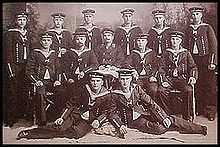Walther Schwieger
| Walther Schwieger | |
|---|---|
 Walther Schwieger (1917) | |
| Born |
7 April 1885 Berlin |
| Died |
5 September 1917 (aged 32) North Sea |
| Allegiance |
|
| Service/branch |
|
| Years of service | 1903 - 1917 |
| Rank | Kapitänleutnant |
| Commands held |
U-14, 1 Aug 1914 – 15 Dec 1914 U-20, 16 Dec 1914 – 5 Nov 1916 U-88, 23 Jul 1916 – 5 Sep 1917 |
| Battles/wars | U-boat Campaign (World War I) |
| Awards |
Iron Cross 1st class Pour le Mérite |
Walther Schwieger (7 April 1885, Berlin – 5 September 1917, North Sea) was an officer of the Imperial German Navy (Kaiserliche Marine) and a U-boat commander during World War I, noted for his role in the sinking of the RMS Lusitania.
In 1903 he joined the Imperial German Navy and from 1911 onwards he served with the U-boat Service. In 1912 he took over the command of the U-14. After the outbreak of World War I in 1914 he was promoted to Kapitänleutnant and given command of the U-20.
On 7 May 1915, Schwieger was responsible for U-20's torpedoing of the passenger liner RMS Lusitania leading to the deaths of 1,198 people, an event that played a role in the United States' later entry into World War I. He also torpedoed SS Hesperian on 4 September and SS Cymric on 8 May 1916.
Schwieger was killed in action when his U-boat, U-88, was chased by HMS Stonecrop, hit a British mine, and sank on 5 September 1917, north of Terschelling at 53°57′N 4°55′E / 53.950°N 4.917°ECoordinates: 53°57′N 4°55′E / 53.950°N 4.917°E.
At the time of his death, Schwieger had sunk 49 ships with 183,883 gross register tons (GRT) with three submarines on 34 missions. He was the sixth most successful submarine commander of World War I. His body remains entombed in U-88.
